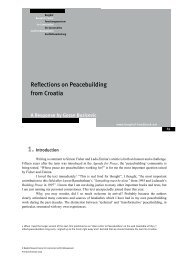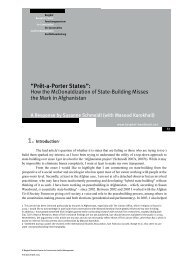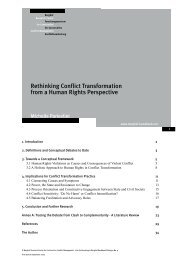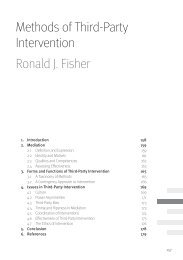Methods of Third-Party Intervention - Berghof Handbook for Conflict ...
Methods of Third-Party Intervention - Berghof Handbook for Conflict ...
Methods of Third-Party Intervention - Berghof Handbook for Conflict ...
Create successful ePaper yourself
Turn your PDF publications into a flip-book with our unique Google optimized e-Paper software.
Fisher<br />
Most <strong>for</strong>ms <strong>of</strong> mediation in domestic settings, at least in North<br />
America, enjoy reasonable rates <strong>of</strong> success, usually above fifty per cent in<br />
terms <strong>of</strong> settlement rates. Overall satisfaction with mediation and<br />
compliance with agreements are also moderately high in absolute terms,<br />
as well as in comparison to traditional methods <strong>of</strong> management. The<br />
overall sense is that mediation works, and that it is usually well-received<br />
and cost-effective in comparison with authoritative and adversarial<br />
alternatives, such as litigation in the court system.<br />
At the international level, however, studies <strong>of</strong> mediation<br />
effectiveness in achieving settlements show far more mixed results, with<br />
settlement rates varying from around ten to approximately fifty percent,<br />
depending on the measure <strong>of</strong> success used and the cases <strong>of</strong> intervention<br />
studied. Sadly, mediation success in protracted civil wars <strong>of</strong> an<br />
ethnopolitical nature is especially low, in the order <strong>of</strong> ten to twenty<br />
percent. Here, there appears to be a level <strong>of</strong> intractability associated with<br />
identity conflicts that have escalated to widespread violence, which is<br />
particularly resistant to intervention ef<strong>for</strong>ts.<br />
The practice <strong>of</strong> third-party consultation is much less developed<br />
and less frequently employed than is mediation in intercommunal or<br />
international disputes. Nonetheless, my recent review <strong>of</strong> three decades <strong>of</strong><br />
un<strong>of</strong>ficial third-party interventions yielded generally positive results, at<br />
least according to the case analyses <strong>of</strong> the interveners (Fisher 1997). An<br />
assessment <strong>of</strong> the outcomes <strong>of</strong> a variety <strong>of</strong> problem-solving workshops<br />
and similar interventions shows evidence that the vast majority do indeed<br />
make a positive contribution to conflict resolution. Specifically, fifty-eight<br />
percent were seen as having a positive influence on or making a tangible<br />
contribution to the wider peace process, while twenty-six percent made<br />
tangible contributions to negotiations in terms <strong>of</strong> analyses, <strong>for</strong>mulations,<br />
or frameworks. These initial results support the expanded use <strong>of</strong><br />
interactive conflict resolution both in its own right and as a<br />
complementary activity to <strong>of</strong>ficial peacemaking.<br />
IV.6 The Ethics <strong>of</strong> <strong>Intervention</strong><br />
The question <strong>of</strong> the ethics <strong>of</strong> intervention at both the individual<br />
and institutional levels is both a political and a practical matter. At its<br />
root, it involves the way in which moral and ethical principles are<br />
translated into guidelines <strong>for</strong> practice and from there into assurances to<br />
be provided to those affected by one's work. Ethics is not simply a matter<br />
<strong>of</strong> do’s and don’ts; it is impossible to <strong>for</strong>mulate simple prescriptions<br />
which will govern all situations. Rather, it is best understood as an<br />
ingrained part <strong>of</strong> the identity <strong>of</strong> individuals and organizations. Those who<br />
presume to intervene in the lives <strong>of</strong> others, especially in critical situations<br />
<strong>of</strong> conflict, need to consider very consciously the moral and ethical<br />
consequences <strong>of</strong> their actions. As with the law, ignorance is no excuse.

















